Energy Efficiency
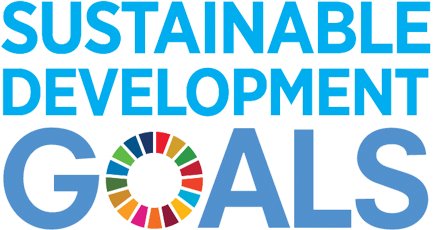
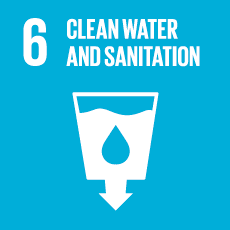
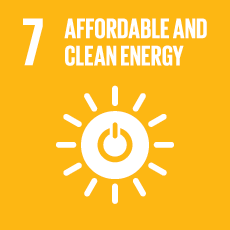


Key Performance in 2024
Reduction in energy consumption
Proportion of renewable energy use compared
to total energy consumption
Reduction GHG emissions from emission reduction projects
Water usage intensity per revenue unit
Percentage of water reused and recycled compared to total water consumption
Assessment of ‘Water Stress’ risk areas for the Company and Critical Tier 1 Supplier in agricultural products
Key Progress in 2024

Electric Vehicle (EV) project for transportation processes and delivery services

Continuously electricity generation projects from solar energy via installed Solar PV Rooftops

Water Conservation Program

Projects for supplier and employee engagement in environmental impact reduction

Continuously water scarcity risk assessment project in Critical Tier 1Suppliers operating areas
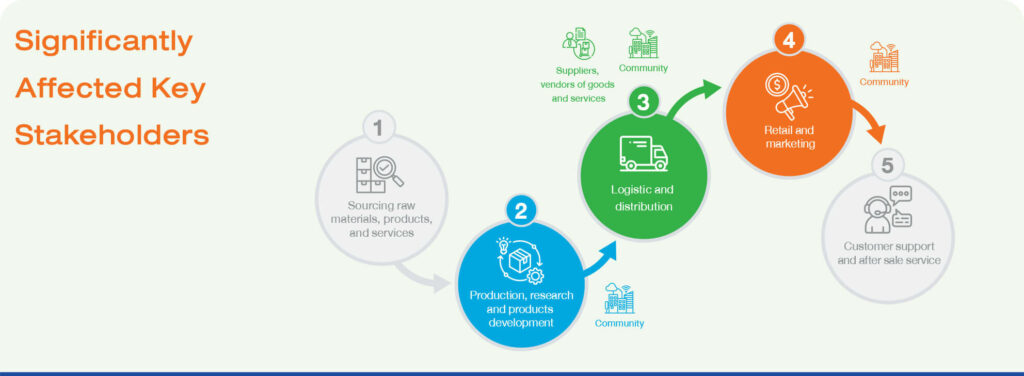
Supporting the SDGs

SDG 6 Ensure availability and sustainable management of water and sanitation for all
6.3 Improve water quality by reducing pollution, eliminating dumping and minimizing release of hazardous chemicals and materials, halving the proportion of untreated wastewater and substantially increasing recycling and safe reuse globally
6.4 Substantially increase water-use efficiency across all sectors and ensure sustainable withdrawals and supply of freshwater to address water scarcity and substantially reduce the number of people suffering from water scarcity

SDG 7 Ensure access to affordable, reliable, sustainable and modern energy for all
7.2 Increase substantially the share of renewable energy in the global energy mix
7.3 Double the global rate of improvement in energy efficiency

SDG 12 Ensure sustainable consumption and production patterns
12.2 Achieve the sustainable management and efficient use of natural resources

SDG 13 Take urgent action to combat climate change and its impacts
13.1 Strengthen resilience and adaptive capacity to climate-related hazards and natural disasters in all countries
Performance Against Goal
Results of the “Double Materiality Matrix”
Sustainable Dimension
Impact level for application in business operations
Progress against Short-term and Long-Term Goals
To reduce the total energy consumption compared to business-as-usual
Performance Summary 2024
Total Energy Consumption
CP ALL and Subsidiaries
Energy Intensity per Revenue Unit
CP ALL and Subsidiaries
Total Energy Consumption by Source Type
CP ALL and Subsidiaries
Total Non-Renewable Energy
CP ALL and Subsidiaries
Total Renewable Energy by Type
CP ALL and Subsidiaries
Total Electricity Purchased Externally by Source
CP ALL and Subsidiaries
The Coverage of the Report on Total Energy Consumption Volume CP ALL and Subsidiaries
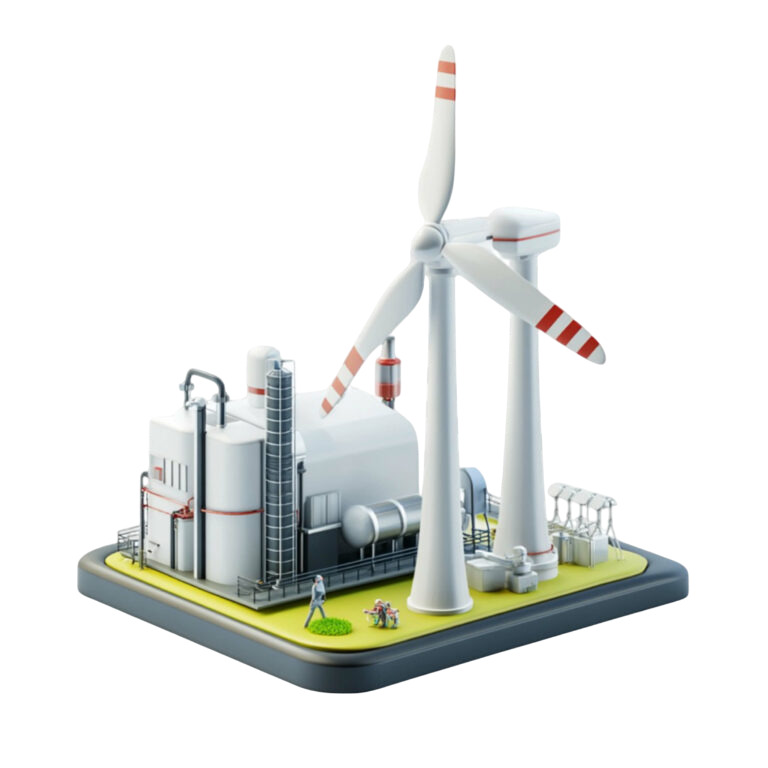
Risks and Opportunities
The United Nations reports that global natural resource consumption is expected to increase by 60% by 2060 compared to 2020 levels. Additionally, resource scarcity, water shortages, and droughts caused by climate change, along with rising demand for resources and a shift towards environmentally friendly alternative energy, necessitate changes in industrial operations. Industries must transition away from fossil fuel energy, adopt clean and renewable energy sources, enhance resource efficiency, and establish strategies to mitigate climate change impacts, aiming for a zero-carbon-emissions future.
Natural resource insecurity has a significant influence on global markets, driving the adoption of clean energy technologies and enhancing the efficiency of essential natural resources for both livelihood and business operations. This shift pushes the Company to continuously develop energy technologies, increase the proportion of renewable energy usage, improve water efficiency, and conserve water to mitigate the risk of shortages. These efforts aim to minimize environmental and social impacts while upholding fundamental human rights, including access to a good quality of life, health, clean food, and water. Additionally, they help reduce risks affecting production processes and costs while enhancing business resilience to meet rapidly changing demands.
Management Approach
The Company is prepared to address challenges related to natural resource consumption and energy transition by establishing environmental policies, a sustainable energy management plan, and responsible natural resource usage. Under the “7 Go Green” environmental policy, the Company focuses on four key areas: environmentally friendly store and distribution center operations (Green Store), eco-friendly logistics (Green Logistic), sustainable packaging management (Green Packaging), and environmental awareness promotion (Green Living). Additionally, the Company has integrated the 2024-2025 sustainability framework, “2 Reductions, 4 Creations, 1 DNA,” to enhance long-term sustainability efforts.
In addition, the Company aims to advance and enhance energy reduction management in accordance with international standards ISO 14001 and ISO 50001. This includes utilizing renewable energy technologies such as solar, wind, geothermal, and biomass energy, as well as adopting electric-powered logistics vehicles. The Company also focuses on mitigating risks related to water scarcity, promoting water reuse and recycling, and fostering collaboration with internal personnel, business networks, and surrounding communities to ensure efficient energy and water resource management through initiatives under the “2 Reductions” strategy. Additionally, the Company analyses the proportion of agricultural product procurement from Critical Tier 1 Suppliers to assess water stress risks, enabling the tracking and mapping of high-risk areas within the supply chain. This allows for the identification of key suppliers and agricultural product volumes sourced from high-risk areas while implementing effective water management risk mitigation measures.
The Company sets short-term and long-term goals for energy conservation and water resource management. Activities includes establishing a process for monitoring and analysing energy and water usage data across all operational areas to identify opportunities for operational improvements and ensure continuous performance tracking.
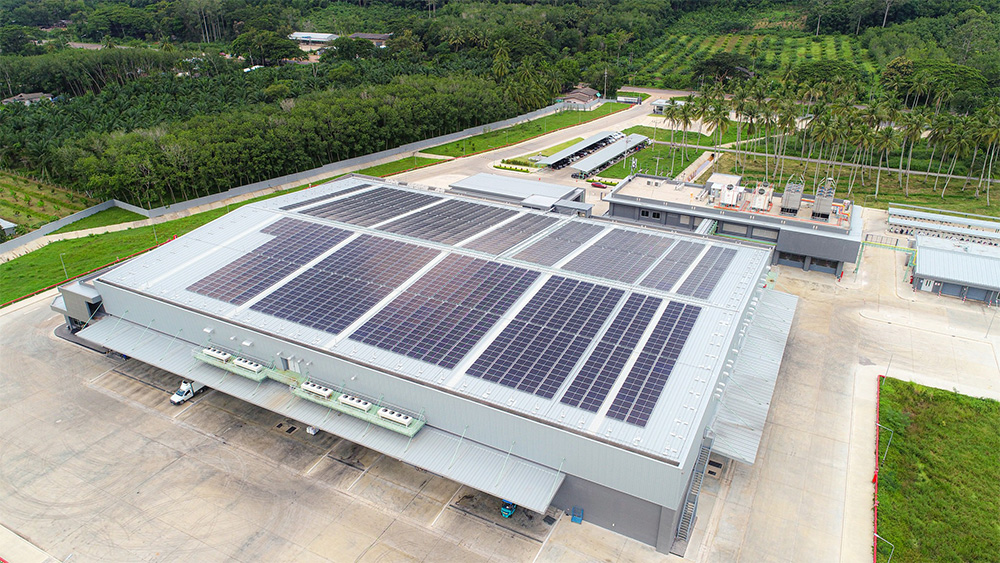
Energy Conservation Project
In addition to implementing strategic projects for environmentally friendly store and distribution center operations (Green Store) and eco-friendly logistics operations (Green Logistic), the Company is committed to elevating its operations to meet international environmental standards (ISO 14001 - Environmental Management Systems) and international energy management standards (ISO 50001 - Energy Management). The Company also conducts quarterly energy performance assessments to identify opportunities for improving energy efficiency. Furthermore, the Company continuously collects, reviews, audits, and analyzes energy usage data across all operational areas in 3 key locations as follows.

Factories and distribution centers

Factories located in industrial estates

Sales centers, and offices not located in industrial estates
Project for the operation of environmentally friendly stores and sales centers
In 2024, the Company enhanced energy reduction measures through the CP ALL Sustainability Framework 2024-2025, “2 Reductions, 4 Creations, 1 DNA,” aiming to improve energy efficiency under the “2 Reductions” strategy to lower greenhouse gas emissions from business operations and reduce energy costs. This initiative is divided into four operational approaches as follows:

Improve energy efficiency

Increase the proportion of renewable energy use

Use environmentally friendly refrigerants

Raise awareness and encourage behavioural change among employees
1. Increase energy efficiency
| Operational Overview | Area of Operation | Performance in 2024 |
|---|---|---|
| Replace old light bulbs with LED lights, which are high-efficiency, durable, safe, have a long lifespan, and reduce maintenance costs | 7-Eleven Stores |
 Replaced with LED lights in 846 branches Replaced with LED lights in 846 branches Reduced energy costs by 0.83 million Baht per year Reduced energy costs by 0.83 million Baht per year Reduced electricity consumption by 146.86 MWh Reduced electricity consumption by 146.86 MWh Reduced GHG emissions by 64.91 tCO2e Reduced GHG emissions by 64.91 tCO2e |
| Makro Distribution Center |
 Replaced with LED lights in 38 branches Replaced with LED lights in 38 branches Reduced energy costs by 5.35 million Baht per year Reduced energy costs by 5.35 million Baht per year Reduced electricity consumption by 1,338.25 MWh Reduced electricity consumption by 1,338.25 MWh Reduced GHG emissions by 670 tCO2e Reduced GHG emissions by 670 tCO2e |
|
| Lotus’s Store |
 Replaced with LED lights in 81 branches Replaced with LED lights in 81 branches Reduced energy costs by 8.28 million Baht per year Reduced energy costs by 8.28 million Baht per year Reduced electricity consumption by 1,952.28 MWh Reduced electricity consumption by 1,952.28 MWh Reduced GHG emissions by 904 tCO2e Reduced GHG emissions by 904 tCO2e |
|
| Developed 2,017 units of microwave ovens with an inverter system | 7-Eleven Stores |  Reduced electricity consumption by 1,469.37 MWh per year Reduced electricity consumption by 1,469.37 MWh per year Reduced GHG emissions by 649 tCO2e Reduced GHG emissions by 649 tCO2e |
| Improved the refrigeration system of the open showcase freezer, using 2 units per compressor coil, and enhanced the insulation | 7-Eleven Stores |  Reduced electricity consumption by 33,235.01 MWh per branch per year Reduced electricity consumption by 33,235.01 MWh per branch per year Reduced energy costs by 48 million Baht per year Reduced energy costs by 48 million Baht per year Reduced GHG emissions by 14,690 tCO2e Reduced GHG emissions by 14,690 tCO2e |
| Replaced 632 inverter-type condensing unit vaults | 7-Eleven Stores |  Reduced electricity consumption by 1,841.5 MWh Reduced electricity consumption by 1,841.5 MWh Reduced GHG emissions by 325 tCO2e Reduced GHG emissions by 325 tCO2e |
| Replaced fixed-speed air conditioning units with inverter models | 7-Eleven Stores |  Reduced electricity consumption by 735.8 MWh Reduced electricity consumption by 735.8 MWh Reduced GHG emissions by 814 tCO2e Reduced GHG emissions by 814 tCO2e |
| Replaced cooling units with those using environmentally friendly refrigerants | 7-Eleven Stores |  Reduced electricity consumption by 1,747.38 MWh Reduced electricity consumption by 1,747.38 MWh Reduced GHG emissions by 772 tCO2e Reduced GHG emissions by 772 tCO2e |
| Replaced air conditioning chillers with high-efficiency Variable Speed Drive systems | Makro Wholesale Store |  5 branches 5 branches Reduced GHG emissions by 683 tCO2e Reduced GHG emissions by 683 tCO2e |
| Replaced fixed-speed split-type air conditioners (AC) with high-efficiency Variable Refrigerant Flow (VRF) systems, reducing the operation based on temperature load conditions | Lotus’s Store and Lotus’s Go Fresh |  10 hypermarket branches 10 hypermarket branches Reduced electricity usage by 3,617.13 MWh per year Reduced electricity usage by 3,617.13 MWh per year  Reduced GHG emissions by 1,675 tCO2e Reduced GHG emissions by 1,675 tCO2e |
| Used Automatic Voltage Regulators (AVR) to adjust and stabilize voltage levels from power sources, ensuring efficient energy use by minimizing electrical losses from excess voltage | Lotus’s Store and Lotus’s Go Fresh |  Installed automatic voltage regulators in 32 branches Installed automatic voltage regulators in 32 branches Reduced electricity usage by 8,798.77 MWh per year Reduced electricity usage by 8,798.77 MWh per year Reduced GHG emissions by 4,074 tCO2e Reduced GHG emissions by 4,074 tCO2e |
| Installed a Building Energy Management System (BEMS) to control the on/off operation of major machinery in buildings for energy savings and efficiency. It also monitors energy usage abnormalities using submeters and sensors, while collecting data for energy management analysis and evaluation | Lotus’s Store and Lotus’s Go Fresh |  Installed energy management systems in 183 branches Installed energy management systems in 183 branches Reduced electricity usage by 4,399.86 MWh per year Reduced electricity usage by 4,399.86 MWh per year Reduced GHG emissions by 2,037 tCO2e Reduced GHG emissions by 2,037 tCO2e |
| Installed a Building Automation System (BAS) to control energy management in buildings, collecting data and assessing the performance of electrical systems for efficient energy usage | Panyapiwat Institute of Management, EEC Campus, SKY BRIGHT CENTER Building |  Used 576,727 MWh per year of electricity Used 576,727 MWh per year of electricity |
2. Increase the proportion of renewable energy use
| Operational Overview | Area of Operation | Performance in 2024 |
|---|---|---|
| Installed rooftop solar panels to generate electricity from solar energy | 7-Eleven Stores |  Increase the proportion of electricity from rooftop solar by installing 530 new branches and expanding the installation of 147 branches Increase the proportion of electricity from rooftop solar by installing 530 new branches and expanding the installation of 147 branches Used 61,659 MWh per year of electricity from rooftop solar Used 61,659 MWh per year of electricity from rooftop solar Reduced GHG emissions by 27,130 tCO2e Reduced GHG emissions by 27,130 tCO2e |
| Makro Wholesale Store and Distribution Center |  Increased the proportion of electricity from rooftop solar by 97 branches Increased the proportion of electricity from rooftop solar by 97 branches Used 60.5 MWh per year of electricity from rooftop solar Used 60.5 MWh per year of electricity from rooftop solar Reduced GHG emissions by 30,281 tCO2e Reduced GHG emissions by 30,281 tCO2e |
|
| Lotus’s Store and Distribution Center |  Increased the proportion of electricity from rooftop solar by 164 branches Increased the proportion of electricity from rooftop solar by 164 branches Used 197,912 MWh per year of electricity from rooftop solar Used 197,912 MWh per year of electricity from rooftop solar Reduced GHG emissions by 24,290 tCO2e Reduced GHG emissions by 24,290 tCO2e |
|
| Installed rooftop solar panels to generate electricity from solar energy (continue) | CPRAM Manufacturing Plant |  Increased the proportion of electricity from rooftop solar by 7 branches Increased the proportion of electricity from rooftop solar by 7 branches Used 7,341.70 MWh per year of electricity from rooftop solar Used 7,341.70 MWh per year of electricity from rooftop solar Reduced GHG emissions by 3,670.12 tCO2e Reduced GHG emissions by 3,670.12 tCO2e |
| Replace light bulbs around a store with solar cell lamps | 7-Eleven Stores |  Installed 2,966 systems Installed 2,966 systems Reduced electricity consumption by 19,712 units Reduced electricity consumption by 19,712 units Reduced GHG emissions by 87 tCO2e Reduced GHG emissions by 87 tCO2e |
| Solar thermal energy (Solar Water Tube) for use in the boiling process and hot water system | CPRAM Manufacturing Plant (Lat Krabang) |  Reduced electricity consumption b 420 MWh per year Reduced electricity consumption b 420 MWh per year Reduced GHG emissions by 209.96 tCO2e Reduced GHG emissions by 209.96 tCO2e |
| Utilized geothermal energy for heating water to clean equipment in the production process, replacing electricity usage in the water heating step | CPRAM Manufacturing Plant (Lat Lum Kaeo) |  Used electricity of 480.60 MWh per year Used electricity of 480.60 MWh per year Reduced GHG emissions by 240.25 tCO2e Reduced GHG emissions by 240.25 tCO2e |
3. Using environmentally-friendly refrigerants
| Operational Overview | Area of Operation | Performance in 2024 |
|---|---|---|
| Replace the cooling equipment with an environmentally friendly refrigerant R290 | 7-Eleven Stores |  Total of 6,434 units Total of 6,434 units |
| Using low-carbon refrigerants with low greenhouse gas emission factors, such as R290 and R-448A | Lotus’s Store and Lotus’s Go Fresh |  Implemented in 120 branches Implemented in 120 branches Reduced GHG emissions by 2,535 tCO2e Reduced GHG emissions by 2,535 tCO2e |
4. Raising employee awareness and promoting behavioral change
| Operational Overview | Area of Operation | Performance in 2024 |
|---|---|---|
| Organizing energy efficiency campaigns at the branch-group level to raise employee awareness and encourage energy conservation and efficient energy usage | Lotus’s Store and Lotus’s Go Fresh |  Number of employees participating in the activity 1,354 persons Number of employees participating in the activity 1,354 persons |
| Lunchtime Lights-Off Measure | Office Building, THE TARA Chaeng Watthana |  Saved energy by 2,089.15 MWh per year Saved energy by 2,089.15 MWh per year Reduce expenses by 8,983.35 Baht per year Reduce expenses by 8,983.35 Baht per year |
| Reducing electricity consumption in office buildings: - Established a co-working space: Provided a shared workspace for employees working after 7:00 PM to minimize electricity usage in private office areas - Adopted artificial intelligence (AI) technology to efficiently manage air conditioning and ventilation systems within buildings, adjusting temperature and airflow based on actual usage and reducing unnecessary energy consumption - Implemented a ranking system for energy consumption among users on each floor to encourage participation in energy conservation and foster awareness of energy responsibility - Set an energy consumption index target for office buildings at 185.5 kWh per square meter per year as a guideline for operations and performance assessment |
Office Building, THE TARA Chaeng Watthana |  Number of employees using the building exceeds 1,526 persons per da Number of employees using the building exceeds 1,526 persons per da |
Eco-friendly transportation project
In 2024, the Company implemented initiatives to develop transportation and distribution systems under the environmental policy “7 Go Green” for continuous 24-hour environmental care. This allowed the Company to reduce fuel consumption and greenhouse gas emissions in transportation operations, aligned with the “2 Reductions” strategy aimed at reducing greenhouse gas emissions from business operations and lowering energy costs. The initiatives are categorized into 4 operational approaches as follows:

Enhance energy efficiency

Increase the proportion of renewable energy use

Promote green transportation systems

Use eco-friendly vehicles
1. Enhance energy efficiency
| Operational Overview | Area of Operation | Performance in 2024 |
|---|---|---|
| Replacing traditional light bulbs with LED lights in 7-Eleven distribution centers | 7-Eleven Distribution Center |
 Switched to LED lights in 20 branches Switched to LED lights in 20 branches Reduced energy costs by 30 million Baht per year Reduced energy costs by 30 million Baht per year Reduced electricity usage by 7.5 MWh Reduced electricity usage by 7.5 MWh Reduced GHG emissions by 3,755 tCO2
e Reduced GHG emissions by 3,755 tCO2
e |
2. Increase the proportion of renewable energy use
| Operational Overview | Area of Operation | Performance in 2024 |
|---|---|---|
| Installed solar rooftops for generating electricity from rooftop solar energy | 7-Eleven Distribution Center |
 Increased proportion of electricity from solar rooftops at 20 branches Increased proportion of electricity from solar rooftops at 20 branches Utilized electricity from solar rooftops amounting to 9,078.55 MWh per year Utilized electricity from solar rooftops amounting to 9,078.55 MWh per year Reduced GHG emissions by 3,994.43 tCO2e Reduced GHG emissions by 3,994.43 tCO2e |
3. Promote green transportation system
| Operational Overview | Area of Operation | Performance in 2024 |
|---|---|---|
| Changed transportation vehicles from 4-wheel trucks to jumbo-sized trucks, increasing loading capacity by 30% per trip, and utilized the “Territory Planner (TP)” software to optimize delivery routes, reducing distance traveled per trip and saving fuel | 7-Eleven Distribution Center |
 Reduced transportation distance by 33.4% Reduced transportation distance by 33.4% |
4. Using environmentally friendly vehicles
| Operational Overview | Area of Operation | Performance in 2024 |
|---|---|---|
| Utilizing 100% electric motorcycles (EV Bikes) for the 7Delivery service, along with the continuous installation of electric charging stations at the front areas of 7-Eleven stores | 7-Eleven Stores |
 Total number of 1,700 electric motorcycles Total number of 1,700 electric motorcycles Reduced GHG emissions by 1,156 tCo2e Reduced GHG emissions by 1,156 tCo2e |
| Testing fully electric 4-wheel trucks (EV: Electric Vehicles) for transporting products from distribution centers to 7-Eleven stores | 7-Eleven istribution Center |  Expanded coverage in Bang Bua Thong Distribution Center, Center, and Suvarnabhumi Distribution Center, totaling 2 branches Expanded coverage in Bang Bua Thong Distribution Center, Center, and Suvarnabhumi Distribution Center, totaling 2 branches Total number of 4-wheel electric trucks 39 units Total number of 4-wheel electric trucks 39 units Reduced GHG emissions by 119 tCo2e Reduced GHG emissions by 119 tCo2e |
| Promoting green logistics to reduce greenhouse gas emissions by installing electric vehicle charging stations at the front areas of 7-Eleven stores | 7-Eleven Stores |  Total number of electric vehicle charging stations 52 stations Total number of electric vehicle charging stations 52 stations |
| Utilization of electric vehicles for transportation and goods delivery |
Makro Wholesale Store |  Total number of electric trains for freight transportation 47 units Total number of electric trains for freight transportation 47 units Reduced GHG emissions by 8,933.53 tCo2e Reduced GHG emissions by 8,933.53 tCo2e |
Investments in innovation or research and development to decrease energy consumption
CP All is committed to sustainability, with the goal of achieving carbon neutrality by 2030 and net-zero greenhouse gas emissions by 2050.
A key strategy to accomplish this is to enhance the efficiency of electrical equipment through Green Innovation, which involves the continuous research, development, and use of energy-saving devices. To achieve this, the company is collaborating with its partners and suppliers on various research and development projects.
Examples of this collaboration include:
Open Showcase Version 3 Efficiency Improvement Project
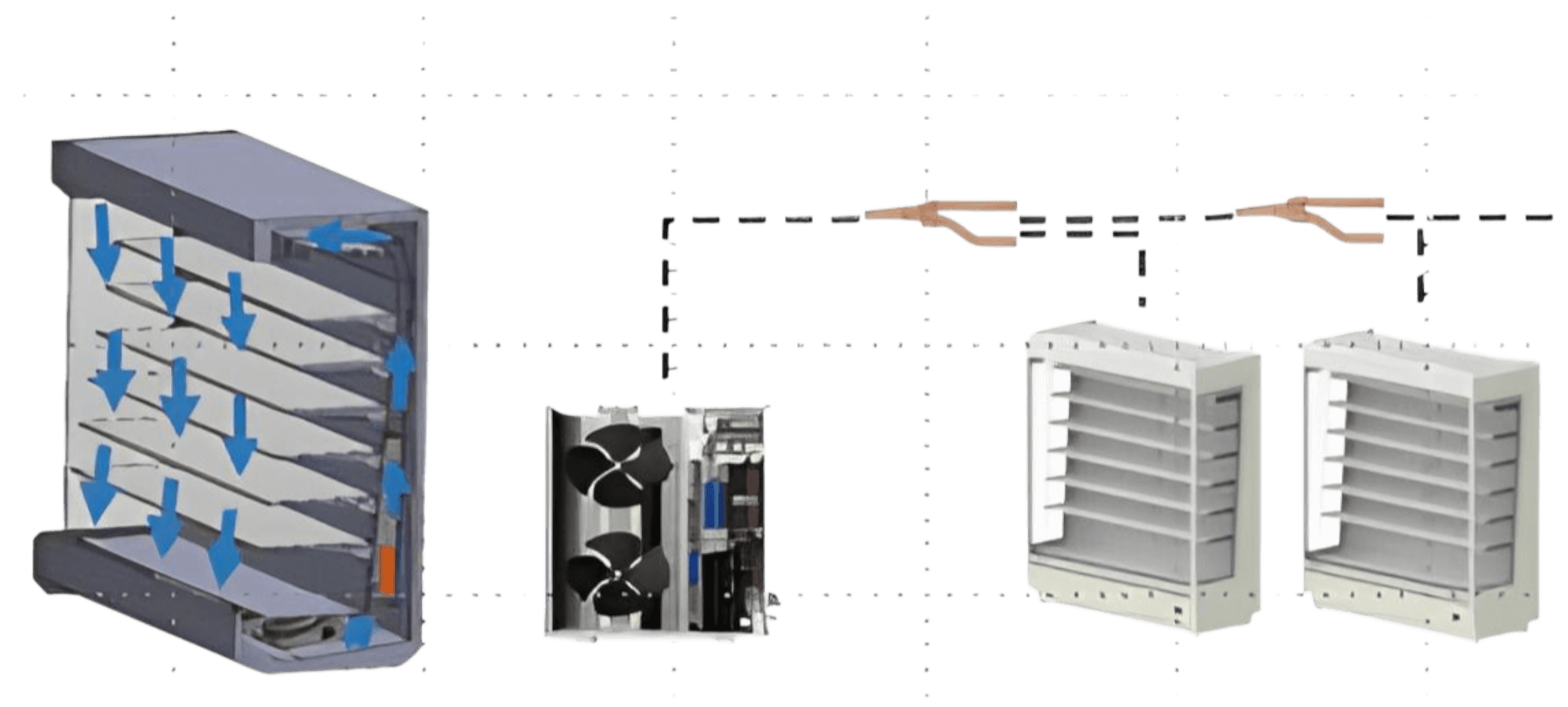 |
|
Vault Room Cooling Efficiency Project
CP All, in collaboration with its partners, is enhancing the cooling performance of the Vault Room—a space that requires precise and stable temperature control. This is achieved by integrating modern technology and equipment to reduce energy consumption and improve operational stability.
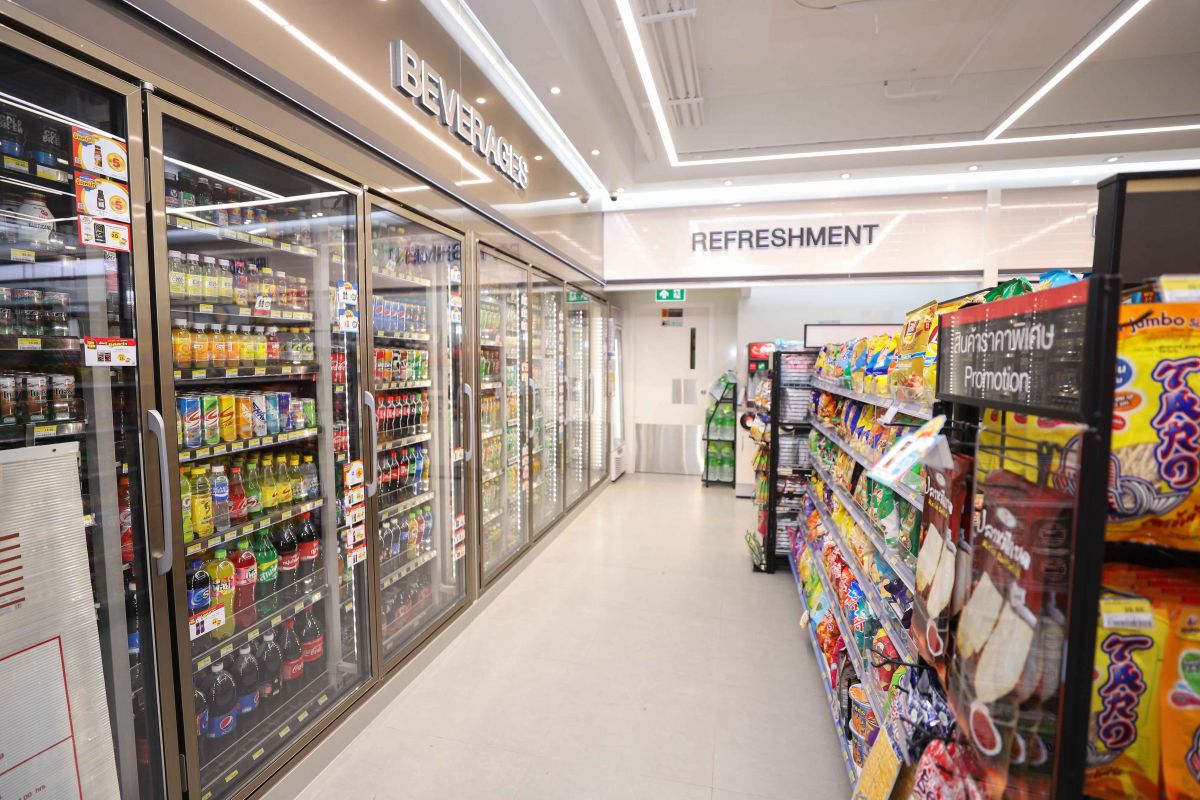 |
|
LED Lighting Development Project
CP All, in collaboration with its partners, developed LED light bulbs that are highly energy-efficient, durable, safe, and long-lasting. These bulbs not only reduce energy consumption but also save on maintenance costs, as they were designed to meet specific standards created exclusively for CP All.
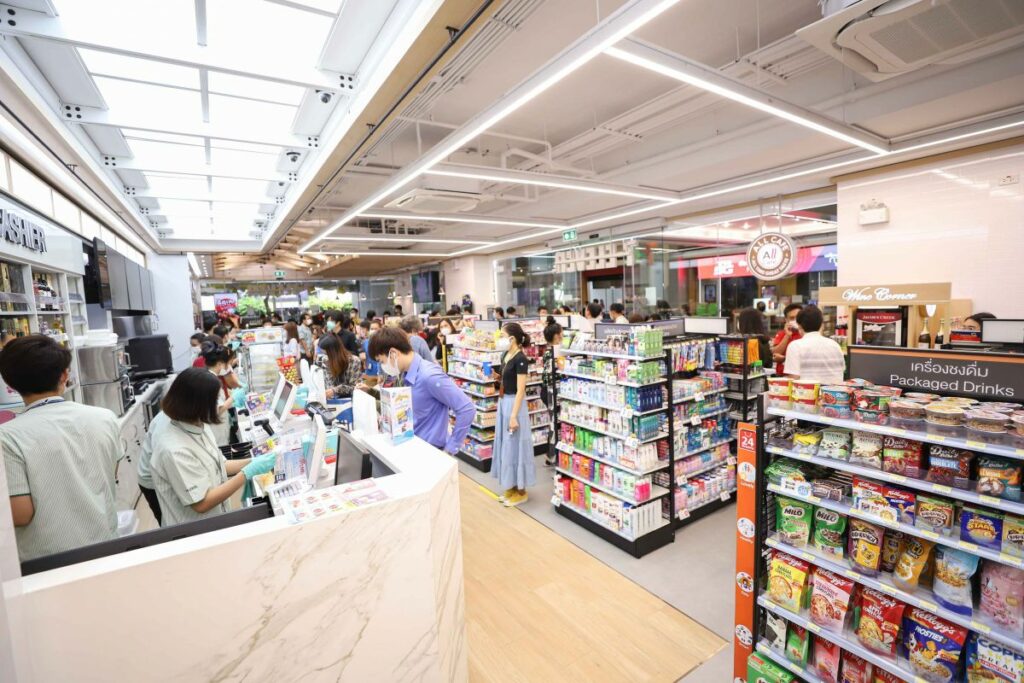
Inverter Microwave Development Project
CP All, in collaboration with its partners, developed a new Inverter technology microwave oven. This technology makes the new microwave 20% more energy-efficient than traditional models. It also distributes heat more evenly and consistently, which reduces cooking time while better preserving the taste and nutritional value of the food.
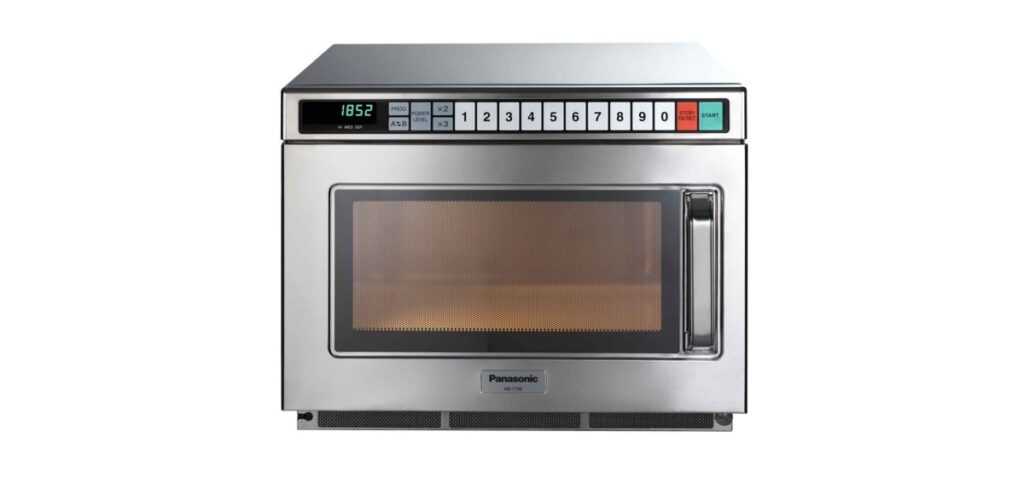
Through these examples of collaboration between CP All and its suppliers on the research and development of energy-efficient equipment, CP All has achieved significant energy savings.
Overview of Results from the Energy Management Efficiency Improvement Project to Reduce Energy Consumption
| Number of Energy Management Efficiency Improvement Projects Implemented | Budget Used for Research and Development to Reduce Energy Consumption | Energy Consumption Reduction | Cost Reduction | Greenhouse Gas Emissions Reduction (Scope 1-2) |
|---|---|---|---|---|
| 34 project | 321 million Baht | 344,965.06 megawatt-hour | 346 million Baht | 124,706.67 tCO2e |
Future Goals and Plans
CP All remains committed to collaborating with its partners on the continuous development and use of energy-saving equipment.
The company has set a goal to reduce the growth of its total net energy consumption by 25% against a business-as-usual (BAU) baseline by 2030. This target falls under the "7 Go Green" strategy, according to a plan that covers four key areas as follows:
Improve energy efficiency
Increase the proportion of renewable energy use
Use environmentally friendly refrigerants
Raise awarness and encourage behavioural change among employees
Energy audits to identify opportunities for improving energy performance
CP ALL continuously collects, monitors, reviews, and analyzes data on energy all operational areas, including manufacturing facilities, distribution centers, 7-Eleven stores, Makro and Lotus sales centers, and offices. Assessments are conducted quarterly using three primary methods:
1) For manufacturing, and distribution facilities, energy performance are conducted according to ISO 14001:2015 standards and ISO 50001:2018. In 2024, CP Ram's facilities in Ladlumkaew, Boen, Ladkrabang, Chonburi, Surat Thani, Khon Kaen, and Lamphun were ISO 14001:2015 certified and CPRAM Chonburi ,CPRAM Ladkrabang ,CPRAM Latlumkaeo were ISO 50001:2018 certified.
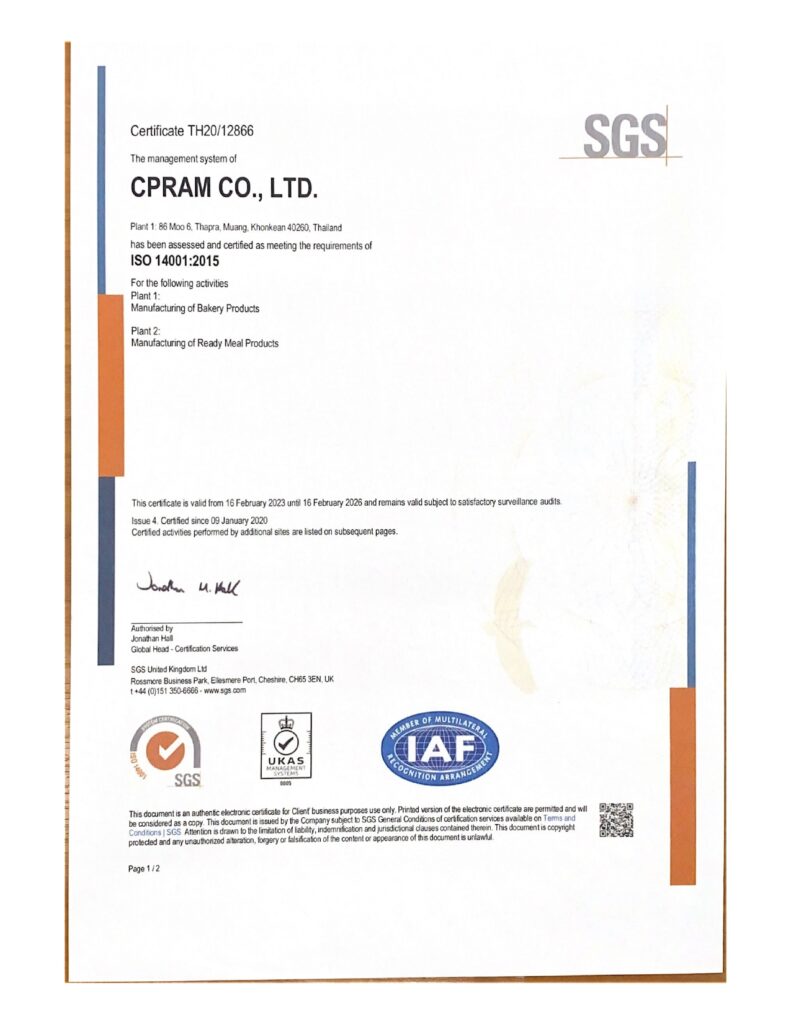 CPRAM ISO 14001 Certificate for Khonkaen Factory
CPRAM ISO 14001 Certificate for Khonkaen Factory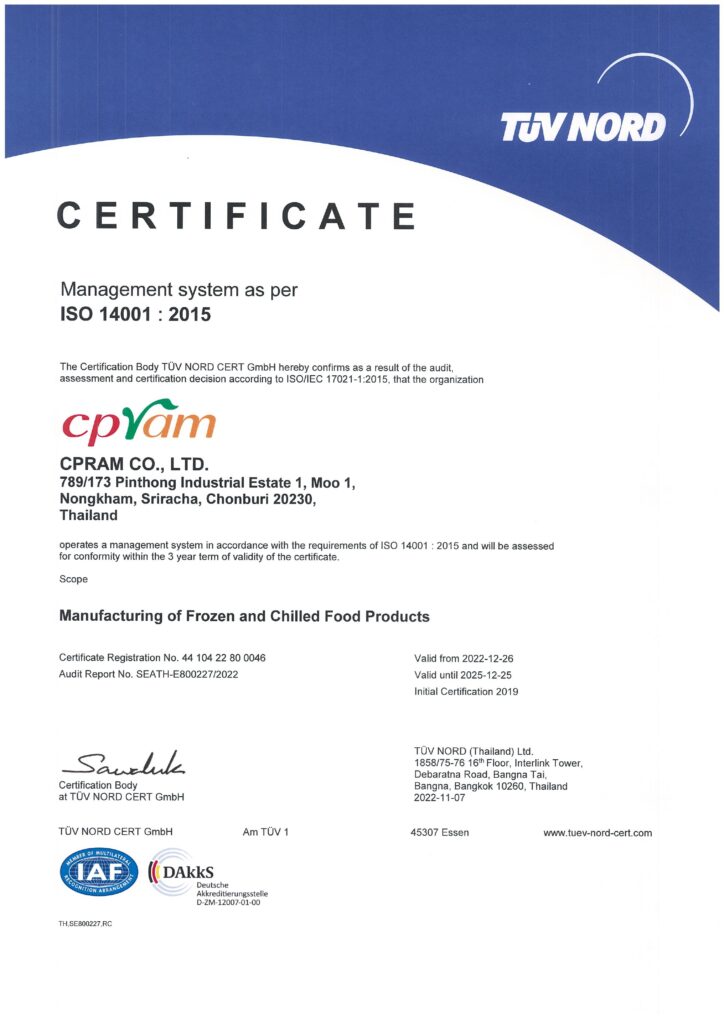 CPRAM ISO 14001 Certificate for Chonburi Factory
CPRAM ISO 14001 Certificate for Chonburi Factory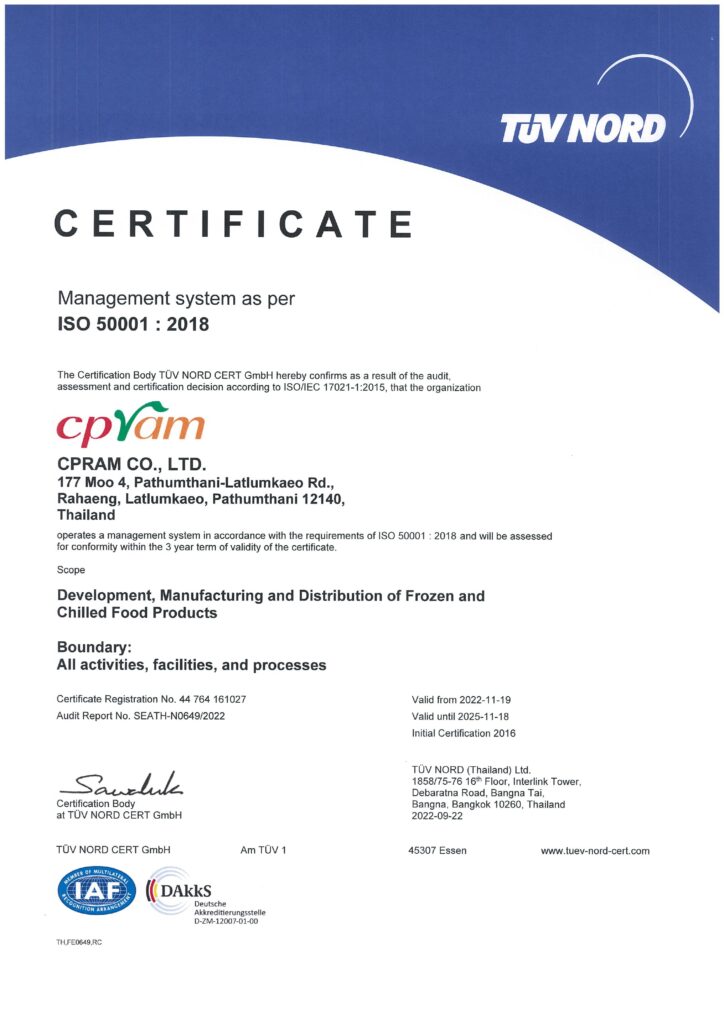 CPRAM ISO 15001 Certificate for Latlumkaeo Factory
CPRAM ISO 15001 Certificate for Latlumkaeo Factory
2) For manufacturing, and distribution facilities, energy performance are conducted according to ISO 14001:2015 standards and ISO 50001:2018. In 2024, CP Ram's facilities in Ladlumkaew, Boen, Ladkrabang, Chonburi, Surat Thani, Khon Kaen, and Lamphun were ISO 14001:2015 certified and CPRAM Chonburi ,CPRAM Ladkrabang ,CPRAM Latlumkaeo were ISO 50001:2018 certified.
3) For sales centers and offices not located in industrial estates, our central greenhouse gas management unit assesses waste management practices to identify opportunities for improvement and reduce impacts on food waste and ecosystems.
Energy Consumption
| Total energy consumption | Unit | FY 2021 | FY 2022 | FY 2023 | FY 2024 | Target for FY 2024 |
|---|---|---|---|---|---|---|
| Total non-renewable energy consumption | MWh |
3,401,828.69 |
3,694,502.43 |
3,767,734.34 |
4,061,126.87 |
4,190,000 |
| Total renewable energy consumption | MWh |
53,741.46 |
138,133.64 | 341,344.67 |
286,259.63 |
|
| Data coverage (as % of denominator) | percentage of: Revenue | 95.52 | 100 | 100 | 100 |
Other Information
Performance Data of Energy Management
| GRI Standared | Required Data | Unit | 2019 | 2020 | 2021 | 2022 | Goal 2022 |
|---|---|---|---|---|---|---|---|
| 302-1 (e) | Total energy consumption | GJ | 9,149,268.02 | 12,355,033.26 | 12,071,157.64 | 13,379,991.59 | |
| Total non-renewable energy | GJ | 544,162.86 | 619,592.84 | 604,641.25 | 749,386.56 | ||
| Total non-renewable energy | MWh | 2,534,095.19 | 3,403,018.32 | 3,302,371.28 | 3,582,051.10 | 3,639,272.87 | |
| Stationary combustion | GJ | 414,339.03 | 487,881.85 | 475,090.43 | 491,169.23 | ||
| - Fuel oil | GJ | 0 | 0 | 0 | 0 | ||
| - Diesel | GJ | 7,980.44 | 12,144.97 | 14,859.53 | 23,390.43 | ||
| - Gasoline | GJ | 0 | 0 | 0 | 11.33 | ||
| - Liquefied petroleum gas | GJ | 348,141.34 | 412,204.24 | 398,890.92 | 403,799.36 | ||
| - Natural gas | GJ | 58,217.25 | 63,532.65 | 61,339.98 | 63,968.11 | ||
| Mobile combustion | GJ | 129,823.82 | 131,710.99 | 129,550.82 | 258,217.33 | ||
| - Diesel | GJ | 114,460.20 | 117,073.99 | 115,181.47 | 191,475.81 | ||
| - Gasoline | GJ | 15,363.62 | 14,626.19 | 10,840.60 | 62,694.48 | ||
| - Liquefied petroleum gas | GJ | 0 | 0 | 3,563.22 | 4,044.88 | ||
| - Natural Gas Vehicles | GJ | 0.0032 | 0.82 | 1.53 | 2.15 | ||
| 302-1 (b) | Total renewable energy | GJ | 15,102.14 | 16,195.78 | 13,442.01 | 47,897.78 | |
| Total renewable energy | MWh | 7,388.48 | 25,297.66 | 47,786.05 | 131,071.49 | ||
| - Electricity from the sun | GJ | N/A | N/A | N/A | 31,798.80 | ||
| - Solar cell | GJ | 2,798.50 | 1,796.64 | 1,796.60 | 2,079.65 | ||
| - Geothermal | GJ | 12,303.64 | 14,399.14 | 11,645.41 | 14,019.32 | ||
| 302-1 (c) | Total electricity purchased externally | GJ | 8,590,003.02 | 11,719,244.63 | 11,453,074.38 | 12,582,707.26 | |
| - National electricity grid | GJ | 8,578,506.85 | 11,631,273.12 | 11,283,895.36 | 12,145,997.39 | ||
| - Solar cell | GJ | 11,496.18 | 87,971.51 | 169,179.02 | 436,709.86 | ||
| 302-3 (a) | Energy intensity per revenue unit | GJ per million Baht | 16.02 | 22.60 | 20.55 | 15.69 |
